ChatGPT and the Cotton Gin
by Wholesome Rage | 22 April 2023
Controversial statement: Slavery’s bad.
Here’s the thing though; It’s not just morally and ethically bad, in a lot of cases it’s also just bad economics.
I want to be careful saying that because a lot of orthodox economists finish there. There is a particular kind of brain that hears that sentence and thinks; This means market forces will cause slavery to self-abolish! Keep the course of automation and development and slavers will be out-competed!
This is why we’ve got to talk about the cotton gin.
See, the cotton gin on its own is a good technology. Separating cotton without one is an immensely time and labour consuming practice. The cotton gin is a relatively simple machine that saves people having to do all that work. In a kind and just world that would let the same amount of people produce more cotton while having more free time. In an economist’s world that lets fewer people make the same amount of cotton and the people who are put out of work can retrain into ‘more productive’ industries. The same amount of work results in more stuff for everybody.
But the cotton gin was invented in a world of slavery. Eli Whitney’s cotton gin came out in 1793, and so slavery exploded in the American South.
What the hell happened?
Well, until that point, slavery was increasingly less profitable than freeholder labour. Using technical language, free labour is motivated to increase its own productivity. In human terms; people who work for themselves will work better, harder or smarter because they’ll get paid more. Slaves will only work as hard as you torture them.
Which also means you have to hire people whose sole job is making the slaves work. People to whip them, supervise them, catch them when they run off. Because slaves don’t want to be slaves. Let’s call these scumbags your ‘human resources’ team. They don’t do any farming on their own but, without them, no farming gets done by your other workers.
So it’s pretty easy to see how freehold labour ends up more productive, right? Everyone tries harder for their own reason and there isn’t this massive waste in having a human resources team. There’s only a narrow margin where the work is mindless, can’t be optimized further, and sufficiently miserable to do that slaves can be made to work harder than freeholders.
If the cotton gin hadn’t been invented for a few more years then slavery abolition might have made it through. The money interests would start to dry up or be outcompeted, there was always heavy opposition to it - and after that happens, then the cotton gin can safely be introduced to everyone’s benefit.
But because it came out the moment that it did it re-established slave owners as the dominant economic model - so slave owners became richer and outcompeted freeholders, and that meant more freeholders had to turn to slavery to compete or be run out of business. And the rest is “history”, a history the United States has not recovered from. I’m going to link James Baldwin debating William Buckley about it here, Baldwin’s speech is beautiful.
This is basically my position on ChatGPT, Midjourney and soon Adobe Firefly. They are the cotton gin of 2023.
I think these technologies are wonderful. No, really! I think the ability for people to represent themselves artistically is one of the most important things for people. As individuals, as a species. I think art is the best way to achieve personal growth. I think it’s healing. I think it’s how we talk to ourselves, how we learn who we want to be and how we want to be seen by the people around us. I think it is the single most important thing a person can do for themselves to learn to be the person that they are and the person they want to be.
But art is restrictive, and getting good at art takes an intimidating amount of time, skill and natural talent - too many are born to the wrong parents, the wrong genetics[1] or simply came into their passions too late.
These tools are being called AI but I think calling them ‘AI’ misrepresents what this software is and what it does. I’m going to call them algorithmic content creation software, or ‘algorithms’ or even just ‘tools’ instead. Normally I’d just use the labels everyone else is using but, like, dignifying this software as ‘AI’ is starting to become a problem among people who think ‘Roko’s Basilisk’ before they think ‘Chinese Room’.
In a kinder world these tools would allow people to make incredible steps in self-expression, to show their ideas at a level that would previously have taken an incredible mastery of skill and talent. That’s good! That’s important! There are too many good and great ideas trapped in the heads of people who can’t execute them!
There are also people who have ideas that aren’t that good or great, but because they can’t execute them they won’t ever be able to reckon with that. This isn’t to be callous, but it’s an important part of what I mean by art as a tool of self-improvement. These tools aren’t just good because they could produce better art for us to consume - they’re good because they can help people get their ‘bad’ art out at all, and have skin in the game to want to develop and improve. If you’re invested in other people having hobbies and interesting conversations, this is great for that! I would love for more people to be more interesting to talk to!
These tools are like training wheels. They’re limiting at a higher level of producing art or essays or code - these algorithms are entirely derivative and can only produce content based on what other people have already made, so they’re good for learning how to express yourself but you’ll need to move past them if you want to express something truly unique. But more people are going to get to that level if they have this safer way to start out, and get to the fun parts faster.
But that’s not how we talk about these tools being used, and that’s not the problem.
Before I left the film industry I had a conversation with a producer at Pixar. He said that they made the cubicle walls there out of stacking interns because they were cheaper and more plentiful than plywood. These tools replace the work that those people were doing.
In a kinder world it would be better that this kind of grunt work is gone. The culture associated with getting people to do that work was abusive. But those entry level jobs were critical for getting a foot into a highly competitive industry at all, which is why people tolerated that abuse to do them.
Likewise the entry-level journalism work I did is likely done by algorithmic tools now, since I was already doing the kind of SEO optimization that makes it naturally suited to this kind of software. A tool like ChatGPT could trivially replace me doing that work, because when I did that work I was already trying to write like ChatGPT. In a better world it would be good for this work to not be done at all, and for recipe websites to just show the damned recipe. In this world the job that kept me from homelessness for six months may no longer exist.
These tools are set to replace a lot of low-level white collar work and that _should _be a good thing. It should be good that nobody has to do the tedious work of basic coding or tedious essay writing or make up recipe anecdotes.
Because the work that can be done by machines probably should be. Tumblr user Voyaging-Too writes about what it means for grant proposals.
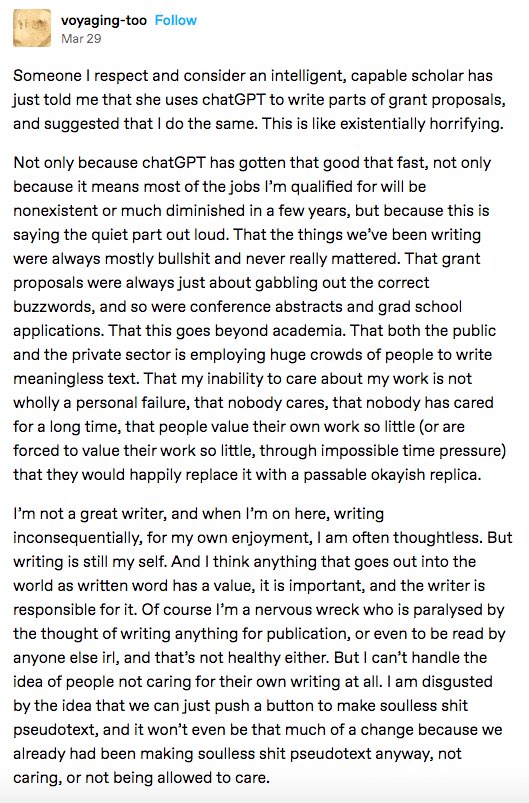
Just now an artist rejected a photography prize because his image had been made by image generation software. Boris Eldagsen won Sony’s “Creative Open” category with his picture “The Electrician” from his “Psuedoamnesia” collection. Here’s that photo.
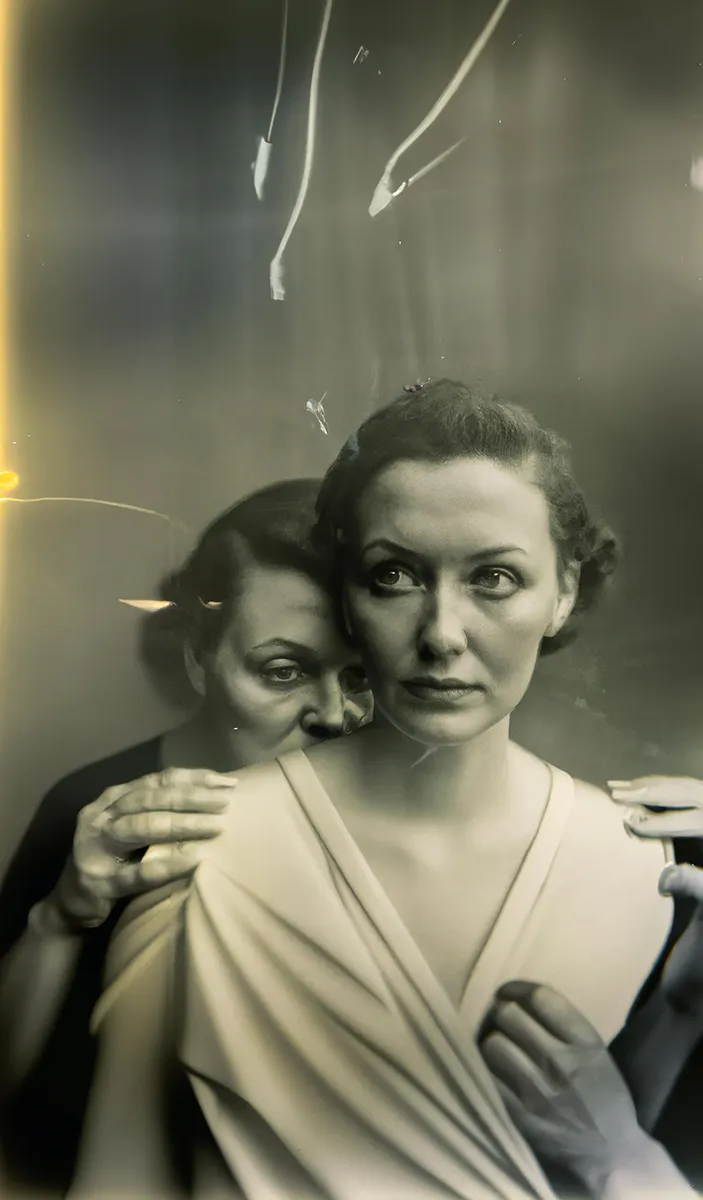
The problem isn’t that this is computer generated. The problem is that this won a creative photography competition. It’s a boring two-shot in an old print style!
High end photography keeps getting punk’d by photos like this, and it deserves it! The only reason AI will win at high end photography is because it prizes this kind of artwork. The only photographers who should need to be put out of work by this software are Getty image makers and stock image photographers.
Meanwhile, Eldagsen uses the tools to make much better, more interesting and more creative compositions. Also from Pseudoamnesia we have The Breath and The Memory;
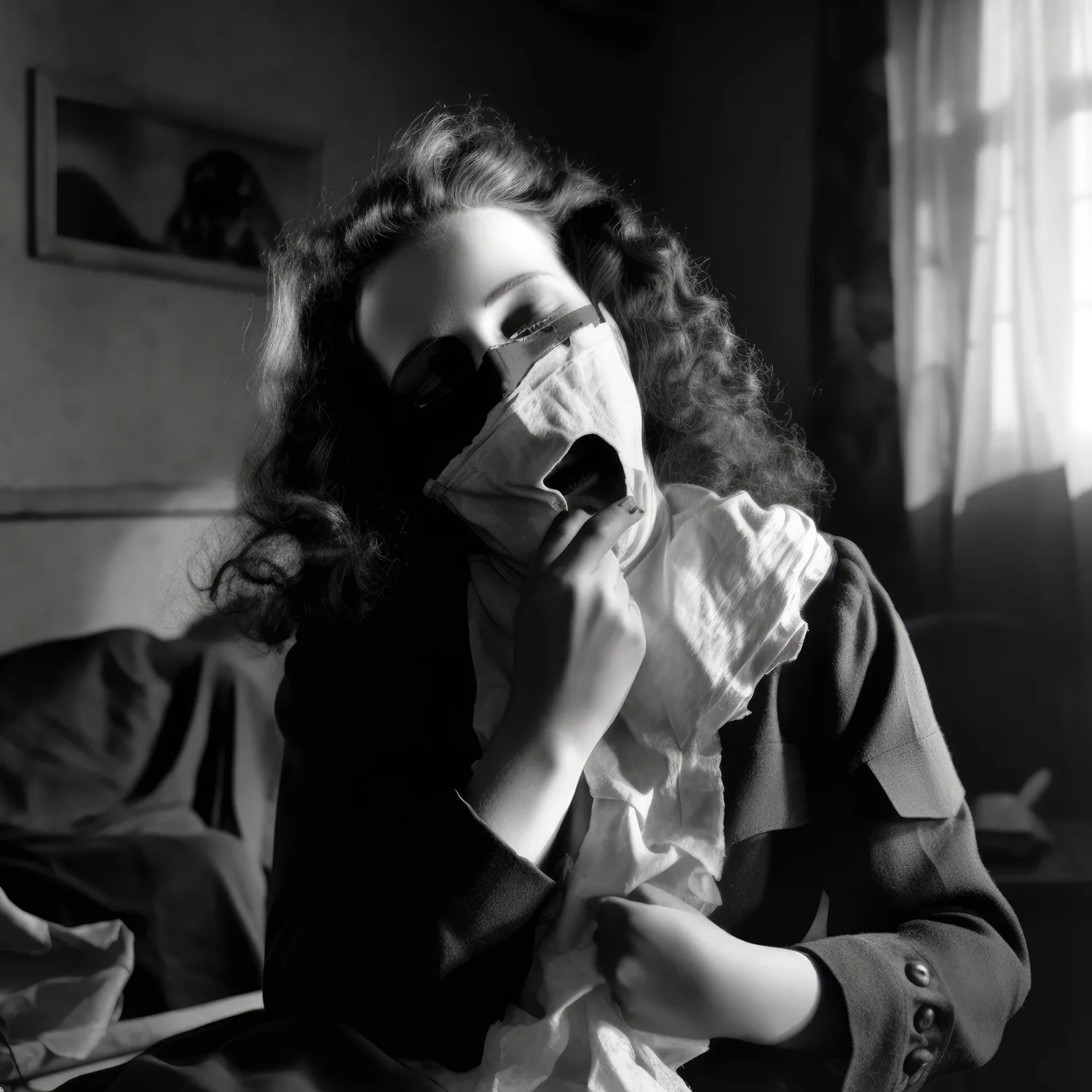
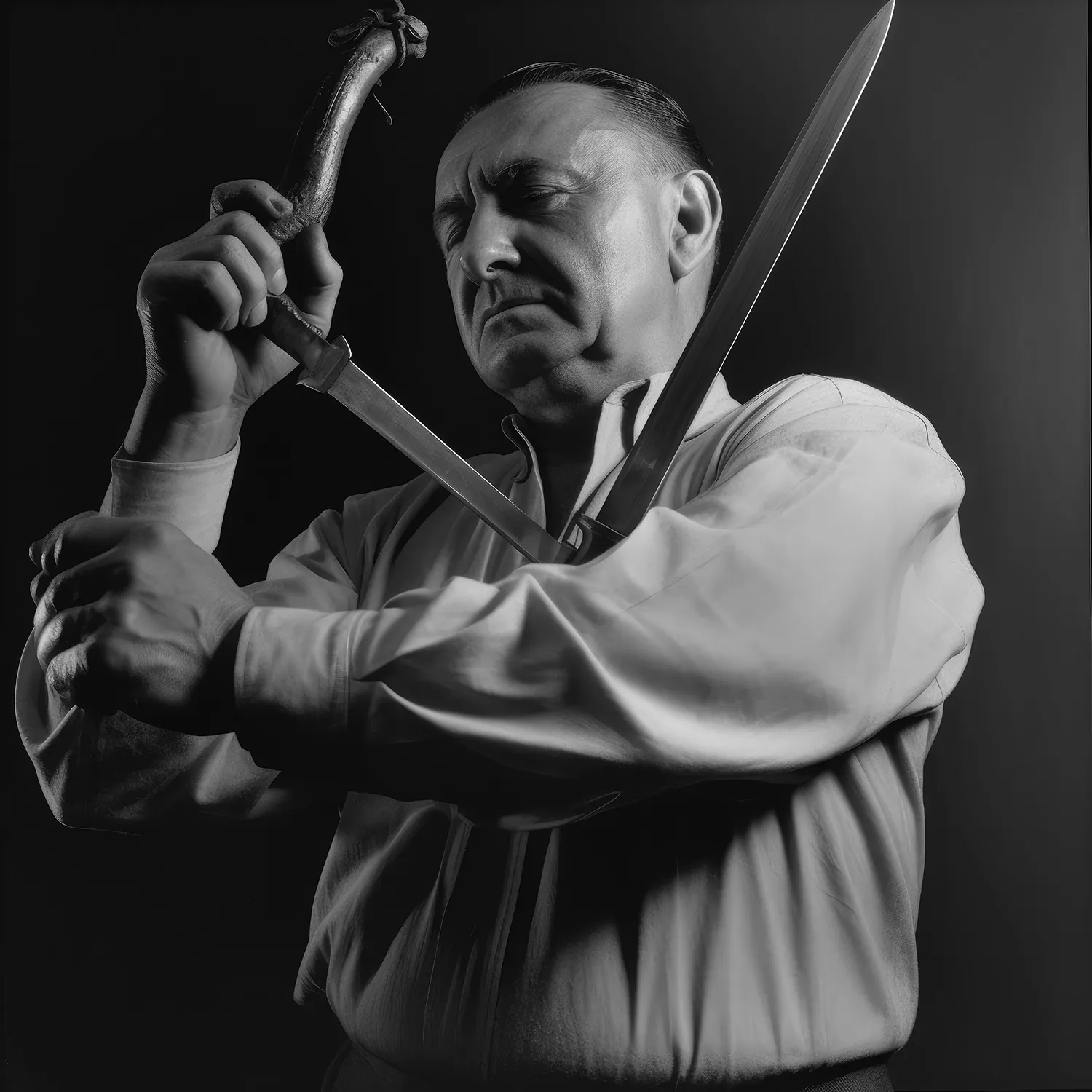
I love both of these! The Breath’s use of the generation tools to turn fabric into a form-fitting mask evoking a scream is an incredible use of the technology! The use of bayonets to imitate a leather strop in composition and reflective texture is inspired!
And these are just ones I’d consider technically flawless. Pseudoamnesia is filled with far more bizarre and creative, and outright disturbing, works that are rougher around the edges.
These weren’t easy compositions to make! They required Eldagsen knowing what he was trying to achieve with the software, having a creative vision, and then iterating on it until he got the results he wanted. To my mind they are as legitimate as ‘art’ as if he had used a camera to make them.
Using the visual language of the 1940s, Boris Eldagsen produces his images as fake memories of a past, that never existed, that no-one photographed. These images were imagined by language and re-edited more between 20 to 40 times through AI image generators, combining “inpainting”, “outpainting” and “prompt whispering” techniques.
The problem isn’t that these tools won a photography competition. The problem is that when an artist submitted genuinely creative entries to the competition that were only possible with inventive use of this software, the judges picked one of the few compositions that would have been - if I am to be blunt here - trivial to get with a traditional camera shoot.
That is to say I could take The Electrician in a day with a digital camera and Photoshop. I couldn’t make The Breath or The Memory.
This is a symptom of these tools making boring professionalism trivial to achieve. The field will have to move past valuing this kind of work entirely. Good!
That’s what I wish these algorithms could be. Just like when essay writing can be seamlessly done by these tools then teaching will have to adapt more sophisticated methods of marking and learning. These kinds of exams are terrible teaching practice but they’ve been hard to dislodge from curriculum because they’re so easy to standardize and mark. It’s bad busywork that should be threatened, just like nobody should have to separate cotton by hand.
But Clarkesworld has had to close submissions due to being overwhelmed by algorithm-generated short stories, when writing is already so poorly paid as to be inaccessible and unsustainable even for the people who do it full time. Adobe Firefly is set to dislodge a lot of illustrators. Art jobs have always been precarious, but now they’re about to be more precarious than ever.
These tools should be good. There are legal and ethical issues with how they’re being made and used right now, it’s the Wild West frontier out there, but those can be solved and already we see people working hard to solve them. The genie can’t be put back in the bottle, but I wouldn’t want it to be.
A different change needs to be made. If this is the start of tedious white-collar jobs being automated, if that middle-income work is being seriously threatened, then we need to start taking policies like a Universal Basic Income (UBI) a lot more seriously. Our capacity to make things is already far in excess of what we actually need - and what would make us happy. It’s just… very, very badly distributed right now.
The alternative is that the existing gulf between low-and-high skilled jobs widens and deepens. Fewer people are paid more, and more people get paid far less. And the jobs that people find intrinsically fulfilling - like art - will be more and more done entirely for free, as it becomes harder and harder to monetize. And as that becomes more true then fewer people will pay for content. People will have less to spend and the free stuff is just as good.
We already saw a lot of this happen with journalism, and we’re still suffering the consequences of not having solved it.
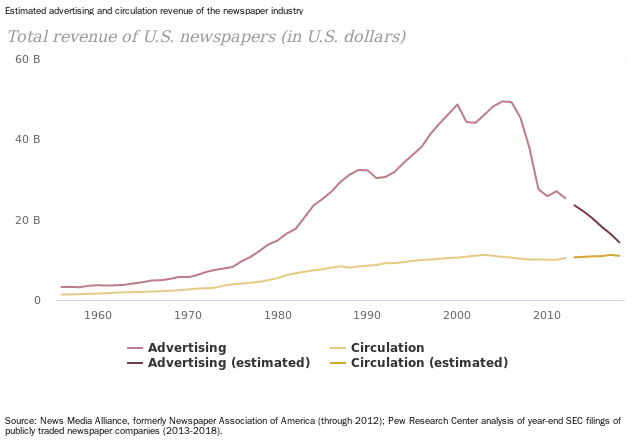
I’ll end with Boris Eldagsen, talking to CNN:
He said he applied “as a cheeky monkey” to find out if competitions “are prepared for AI images to enter. They are not.”
Eldagsen told CNN Tuesday: “It shows that at the moment the photographic world has been taken by surprise after this development that subtly you can create images that look like photography but you don’t need to have the skills and expertise of photographers.” \
He said that AI had left many photographers feeling “threatened and afraid that they are going to lose their jobs which will happen.”
[1] Again I want to be careful with this point. I wanted to be an animator, for instance, but it turns out I have dyspraxia which makes drawing and illustration far, far harder for me to learn than it would be for other people. An incredibly brilliant and talented friend of mine has a condition where they can’t hold imagery in their head at all - they’ll look at an in-game map, close the map screen, and immediately lose their direction because they can only use the map while looking directly at it. There are dozens, if not hundreds or even thousands, of small things like this that can go wrong that can be a barrier to learning music.
This isn’t about the genes that make you ‘the best’ - this is about the problems that prevent you getting to a level where you feel like you can express yourself at all in certain mediums or formats.